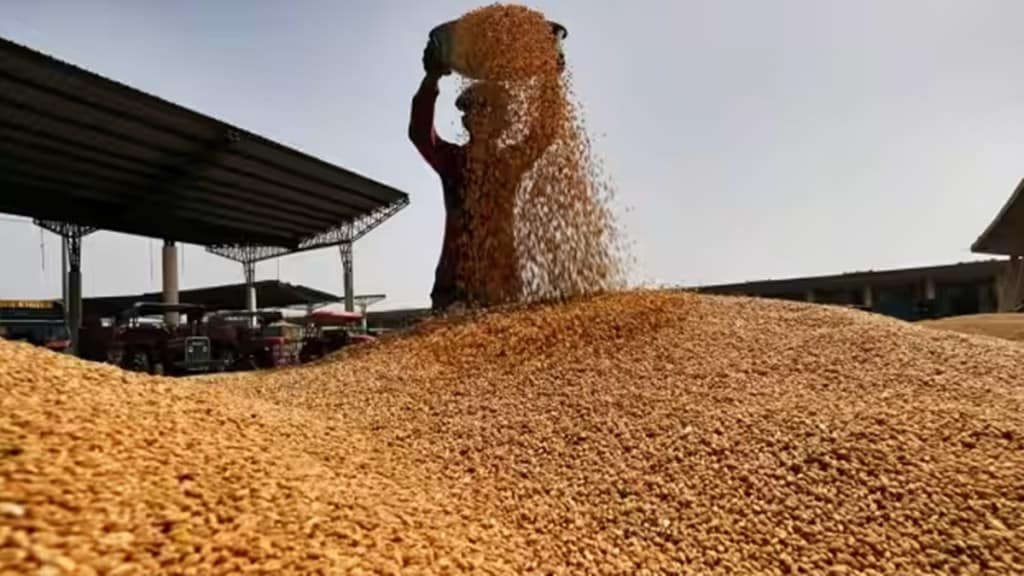The government on Wednesday announced annual hikes in the range of 2-7% in the minimum support prices (MSP) for the winter-sown crops in the 2023-24 crop year.
The MSP of wheat, the key rabi crop, has been raised by 7.05% to Rs 2,275/quintal for 2024-25 marketing season (April-June), the sharpest increase since 2014-15.
The move is despite wheat prices in the wholesale and retail markets remaining elevated for nearly two years, and a ban on exports of the grain imposed in May, 2022 to cool domestic prices.
To incentivize farmers, the MSP of lentil (masur) has been hiked the highest by 7.08% to Rs 6,425/quintal for next marketing season.
The sharper hike in wheat MSP is aimed at encouraging farmers to boost output. A wide disparity was noticed in the official and trade estimates of wheat output in the last season, and market trends suggested inadequate supplies.
Cost of production of wheat for the upcoming season is estimated to be Rs 1128/quintal.
“The hike in MSP is in line with the Union budget 2018-19 announcement that MSPs will be at least 1.5 times the all-India weighted average cost of production, according to an official note released following the meeting of Cabinet Committee on Economic Affairs.
For all crops, the rabi MSP increases this year are the highest since 2018-19, when a new policy of 50% profits over computed cost of production resulted in MSP hikes for rabi crops in the range of 5-7.6%.
Higher MSP is expected to encourage farmers to sell wheat to the Food Corporation of India (FCI), and prevent official stocks falling below the buffer, officials said.
Trade sources said that retail market prices of wheat currently is around Rs 2700/quintal. Retail wheat inflation softened to 7.93% last month, while it had remained in double digits between June 2022 and July, 2023.
Officials said that by incentivising farmers through higher MSP, the government has set a record wheat production target of 114 million tonne (MT) for the 2023-24 season against an estimated output of 112.74 MT in the year ago period.
Because of lower output, wheat procurement at MSP had dropped by 130% to 18.79 MT in the 2022-23 marketing season on year. In the current year, FCI could purchase only 26.2 MT of the grain from the farmers.
The government has banned wheat exports since May 2022 in order to improve domestic supplies.
While elevated MSPs, backed by procurement, could potentially boost rural income and purchasing power, these can also increase inflationary pressures further.
The MSP of mustard seed, which has a share of more than 40% in the country’s edible oil production was hiked by only 3.66% to Rs 5650/quintal for next marketing season while last the hike the remunerative prices provided to farmers was hike by 7.9%.
Among pulses, the MSP of gram, which has a share of 50% in the country’s pulses production, increased by 1.96% to Rs 5,440/quintal.
In the 2022-23 crop year (July-June), because of largely stagnant production and rising demand of lentils, the country imported 0.86 MT of lentil mostly from Canada and Australia, while the domestic production according to the agriculture ministry was estimated at 1.58 MT.
In December, 2022, the government had extended the import duty waiver for lentils by a year, until March 31 2024.
The MSP of barley has been increased by 6.6% to Rs 1,850/quintal for 2024-25 marketing season from Rs 1,735/quintal this year. The safflower MSP has been increased by a moderate 2.65% to Rs 5,800/quintal for next season.
India imports about 55-56% of its total domestic requirement of edible oil while 15% of pulses consumption is met through imports.
In the race to get on top of rising food inflation, the government recently allowed tariff-free imports of crude soybean and sunflower oils till March 31, 2024.
The government fixes MSP following the reports of the Commission for Agricultural Costs and Prices (CACP), which recommends the MSPs for around 23 crops to the government.
Rabi crops are sown during October and November and the produce is harvested from February depending on the maturity period of the crop.

